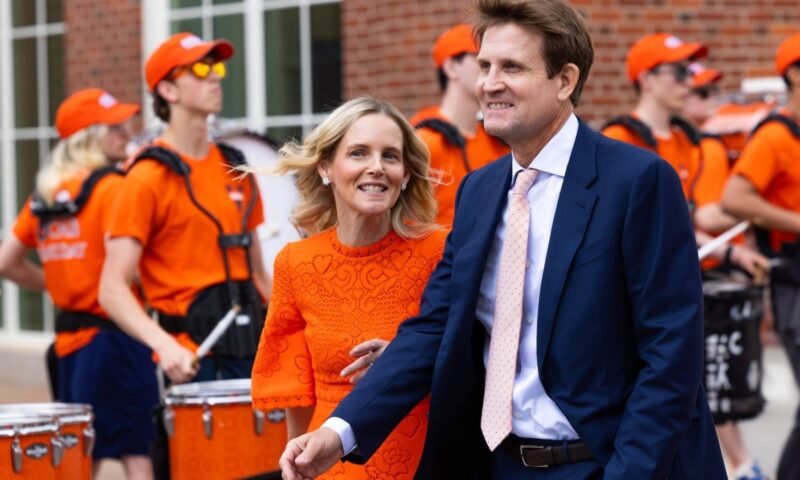What are the primary challenges facing leaders in today’s global business environment? What responsibilities do corporations have to the communities in which they operate? What makes certain leaders successful—or not—in times of crisis?
These were just some of the issues addressed at McIntire’s Seventh Annual Spring Symposium, titled “High-Impact Leadership.” This year’s event, held April 13, 2007, in Old Cabell Hall, featured Simon Robertson, Chairman of Rolls-Royce plc; Judith McHale, former President and CEO of Discovery Communications Inc.; and Tulane University Professor Douglas Brinkley. Brinkley is the author, most recently, of the bestseller The Great Deluge: Hurricane Katrina, New Orleans, and the Mississippi Gulf Coast, a chronicle of failures in leadership at the local, state, and federal level.
The three panelists each spoke on issues of leadership pertinent to their areas of expertise in business and research. They then answered questions from the audience in a forum moderated by Charles W. Sydnor, former President and CEO of Commonwealth Public Broadcasting Corporation.
Fighting for Free Markets
Rolls-Royce’s Robertson led off the event with a talk titled “Long-Term Thinking, Short-Term World: Leadership Challenges in a Global Age.” In his talk, Robertson addressed the challenges of successfully dealing with global supply chains and labor forces and, crucially, of successfully navigating today’s geopolitical and cross-cultural challenges.
In today’s global business climate, Robertson said, business leaders “must fight for openness, understanding, and free markets.” Robertson warned against yielding to protectionist tendencies, warning that although protectionism might yield short-term gains, it ultimately leads to “tension and despair.”
Said Robertson of business leaders’ social, political, and environmental responsibilities, “We must not be complacent.”
Doing Well by Doing Good
Robertson was followed by Discovery’s McHale, who spoke on “Doing Well by Doing Good: Perspectives on Discovery.”
McHale told the audience how she built the Discovery Channel into a global success story, with 1.4 billion subscribers in 170 countries and territories. (Discovery is composed of a wide-ranging stable of socially conscious television channels, including Animal Planet, BBC America, and The Learning Channel.)
She was able to do so, in part, by establishing an open dialogue with the governments of the countries in which Discovery has a presence and ensuring that Discovery acted as a positive force in every country. Another key to the company’s success, she said, is a commitment to its employees. Discovery, she pointed out, invested heavily in its employees, providing them with such vital services as child and eldercare, stress and fitness programs, and concierge services. These investments, she said, yielded rich returns in employee productivity and loyalty. Said McHale, “Corporations can be forces for good in a community.”
It’s Not about the Uniform
The symposium then took a different turn, with Brinkley’s discussion of the “complete collapse of leadership at every level” that surrounded Hurricane Katrina. Brinkley delivered a veritable laundry list of failures, from personal squabbles leading to inaction (and loss of life), to hesitation and equivocation, to panic, to shirking of official duty, to plain-old failure to plan, and then failure to implement plans.
Brinkley’s fascinating description of the leadership vacuum exposed by Katrina provided a compelling case for the importance of good leadership. Brinkley pointed out that a number of ordinary citizens acted with selflessness and courage—although fully one-third of the New Orleans police force left the city. “Leadership is not about the uniform,” he said.
After the three presentations, the panelists answered questions from the audience on such subjects as the sky-high level of executive compensation, corporate recruitment of leaders, and the global political fallout from the Bush administration’s foreign policy.
Brinkley, who chronicled the lives of some of America’s most prominent figures, including Henry Ford, Ronald Reagan, and Teddy Roosevelt, provided the symposium’s closing words: “The greatest American leaders have been judicious, straightforward, and honest.”
A History of Compelling Discussions
The symposium series was established in 2000 to provide a forum for the discussion of the complex nature of organizational success, as well as to address the relationship of commerce to the arts, humanities, and sciences. This year’s forum also integrated themes central to the McIntire School’s LEAD initiative. The forum was co-sponsored by McIntire’s Center for Financial Innovation, Center for Growth Enterprises, and Center for the Management of Information Technology.
“With every symposium, we work to facilitate compelling, multidimensional discussions of timely and important issues,” said McIntire Dean Carl Zeithaml. “The development of leaders capable of successfully navigating today’s complex global realities is an issue of the utmost importance, and we were honored to be joined this year by three such distinguished speakers on the subject.”
By Mary Summers Whittle



